Hercules
Hercules is the Roman name for the Greek divine hero Heracles, who born in Thiva and he was the son of Zeus (Roman equivalent Jupiter) and the mortal Alcmene. In classical mythology, Hercules is famous for his strength and for his numerous far-ranging adventures.
Hercules is known for his many adventures, which took him to the far reaches of the Greco-Roman world. One cycle of these adventures became canonical as the "Twelve Labours," but the list has variations. One traditional order of the labours is found in the Bibliotheca as follows:[2]
- Slay the Nemean Lion.
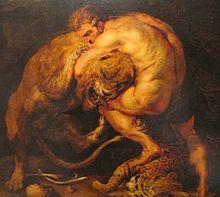
- Slay the nine-headed Lernaean Hydra.
- Capture the Golden Hind of Artemis.
- Capture the Erymanthian Boar.
- Clean the Augean stables in a single day.
- Slay the Stymphalian Birds.
- Capture the Cretan Bull.
- Steal the Mares of Diomedes.
- Obtain the girdle of Hippolyta, Queen of the Amazons.
- Obtain the cattle of the monster Geryon.
- Steal the apples of the Hesperides.
- Capture and bring back Cerberus.
https://en.wikipedia.org/wiki/Hercules
Oedipus
Oedipus was a mythical Greek king of Thebes, the son and killer of Laius, son and consort of Jocasta, and father and sibling of Polynices, Eteocles,Antigone, and Ismene. A tragic hero in Greek mythology, Oedipus accidentally fulfilled the prophecy, despite his efforts not to, that he would end up killing his father and marrying his mother, thereby bringing disaster to his city and family. When the truth was discovered, his wife-mother hanged herself, and Oedipus gouged out his own eyes. They had four children together. The story of Oedipus is the subject of Sophocles's tragedy Oedipus the King, which was followed byOedipus at Colonus and then Antigone. Together, these plays make up Sophocles's three Theban plays. Oedipus represents two enduring themes of Greek myth and drama: the flawed nature of humanity and an individual's role in the course of destiny in a harsh universe.
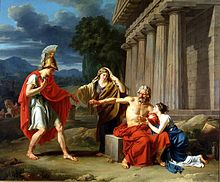
https://en.wikipedia.org/wiki/Oedipus
Antigone
In Greek mythology, Antigone (/ænˈtɪɡəniː/ an-ti-gə-nee; Greek:Ἀντιγόνη) is the daughter/sister of Oedipus and his mother, Jocasta. The meaning of the name is, as in the case of the masculine equivalent Antigonus, "worthy of one's parents" or "in place of one's parents".
Antigone is the subject of a story in which she attempts to secure a respectable burial for her brother Polynices. Oedipus's sons, Eteocles and Polynices, had shared the rule jointly until they quarrelled, and Eteocles expelled his brother. In Sophocles' account, the two brothers agreed to alternate rule each year, but Eteocles decided not to share power with his brother after his tenure expired. Polynices left the kingdom, gathered an army and attacked the city of Thebes in a conflict called the Seven Against Thebes. Both brothers were killed in the battle.
King Creon, who ascended to the throne of Thebes after the death of the brothers, decreed that Polynices was not to be buried or even mourned, on pain of death by stoning. Antigone, his sister, defied the order, but was caught.
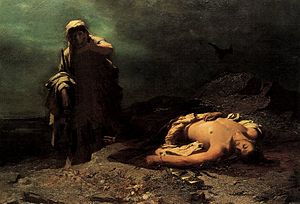
The stories of Antigone has been a popular subject for books, plays, and other works, some of them are :
- Antigone, one of the three extant Theban plays by Sophocles (497 BC – 406 BC) – The most famous adaptation
- Antigone, a play by Euripides (ca. 480 – 406 BC) which is now lost except for some fragments
- Antigona , opera by Tommaso Traetta, libretto by Marco Coltellini (1772)
- Antigona, opera by Josef Mysliveček, libretto by Gaetano Roccaforte (1774)
https://en.wikipedia.org/wiki/Antigone
Epaminondas
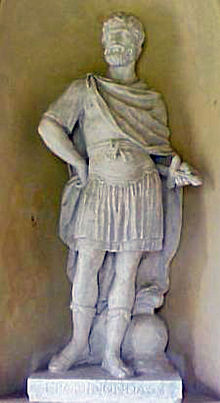 Epaminondas was a Theban general and statesman of the 4th century BC who transformed the Ancient Greek city-state ofThebes, leading it out of Spartan subjugation into a preeminent position in Greek politics. In the process he broke Spartan military power with his victory at Leuctra and liberated the Messenian helots, a group of Peloponnesian Greeks who had been enslaved under Spartan rule for some 230 years, having been defeated in the Messenian War ending in 600 BC. Epaminondas reshaped the political map of Greece, fragmented old alliances, created new ones, and supervised the construction of entire cities. He was militarily influential as well, inventing and implementing several major battlefield tactics.
Epaminondas was a Theban general and statesman of the 4th century BC who transformed the Ancient Greek city-state ofThebes, leading it out of Spartan subjugation into a preeminent position in Greek politics. In the process he broke Spartan military power with his victory at Leuctra and liberated the Messenian helots, a group of Peloponnesian Greeks who had been enslaved under Spartan rule for some 230 years, having been defeated in the Messenian War ending in 600 BC. Epaminondas reshaped the political map of Greece, fragmented old alliances, created new ones, and supervised the construction of entire cities. He was militarily influential as well, inventing and implementing several major battlefield tactics.
The Roman orator Cicero called him "the first man of Greece", and Montaigne judged him one of the three "worthiest and most excellent men" that had ever lived,[1] but Epaminondas has fallen into relative obscurity in modern times. The changes Epaminondas wrought on the Greek political order did not long outlive him, as the cycle of shifting hegemonies and alliances continued unabated. A mere twenty-seven years after his death, a recalcitrant Thebes was obliterated by Alexander the Great. Thus Epaminondas—who had been praised in his time as an idealist and liberator—is today largely remembered for a decade (371 BC to 362 BC) of campaigning that sapped the strength of the great land powers of Greece and paved the way for the Macedonian conquest.
https://en.wikipedia.org/wiki/Epaminondas
Pindar
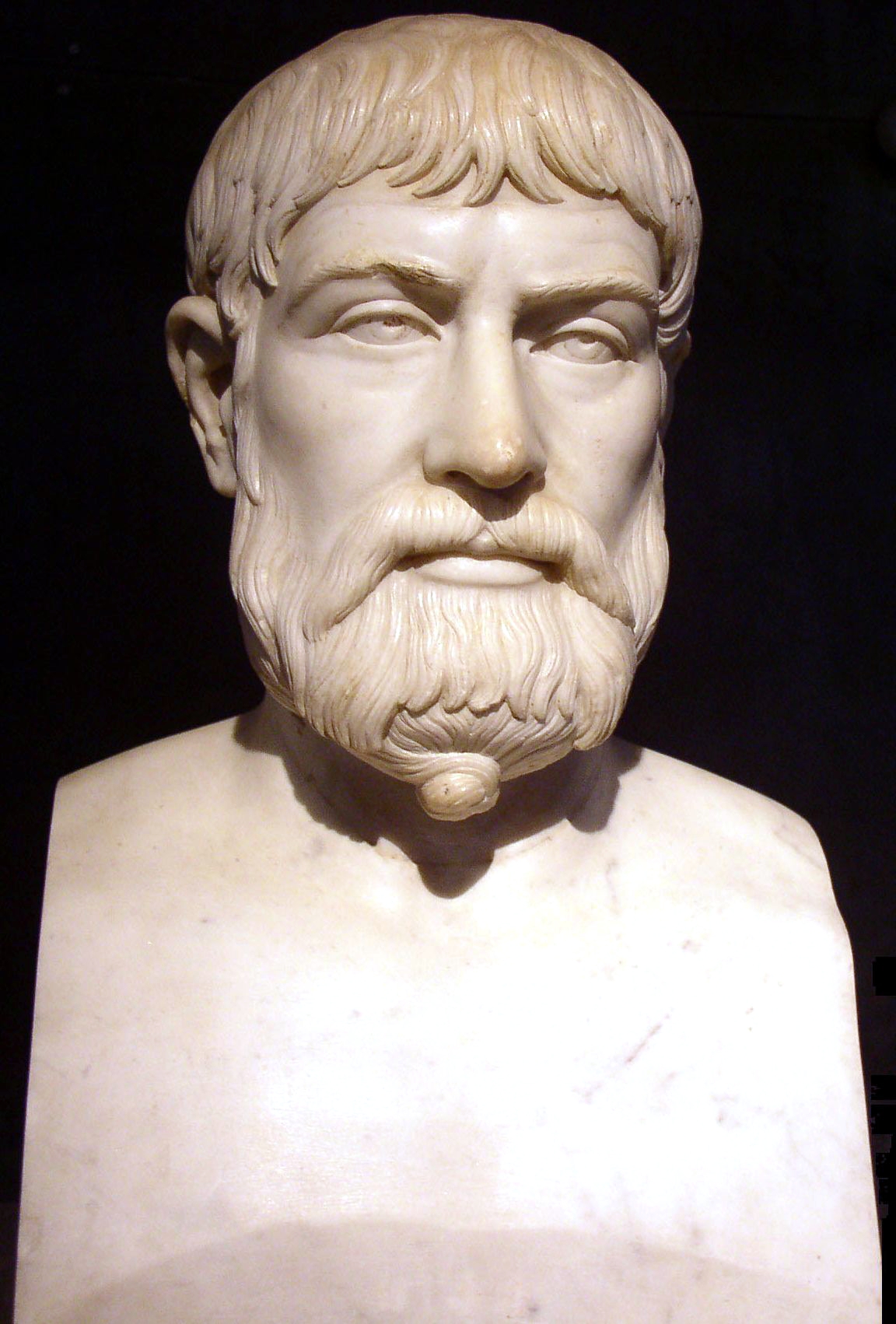 Pindar (c. 522 – c. 443 BC) was an Ancient Greek lyric poet from Thebes. Of the canonicalnine lyric poets of ancient Greece, his work is the best preserved. Quintilian wrote, "Of the nine lyric poets, Pindar is by far the greatest, in virtue of his inspired magnificence, the beauty of his thoughts and figures, the rich exuberance of his language and matter, and his rolling flood of eloquence, characteristics which, as Horace rightly held, make him inimitable."[1] His poems however can also seem difficult and even peculiar. The Athenian comic playwright Eupolis once remarked that they "are already reduced to silence by the disinclination of the multitude for elegant learning".[2] Some scholars in the modern age also found his poetry perplexing, at least until the 1896 discovery of some poems by his rival Bacchylides; comparisons of their work showed that many of Pindar's idiosyncrasies are typical of archaic genres rather than of only the poet himself. His poetry, while admired by critics, still challenges the casual reader and his work is largely unread among the general public.[3]
Pindar (c. 522 – c. 443 BC) was an Ancient Greek lyric poet from Thebes. Of the canonicalnine lyric poets of ancient Greece, his work is the best preserved. Quintilian wrote, "Of the nine lyric poets, Pindar is by far the greatest, in virtue of his inspired magnificence, the beauty of his thoughts and figures, the rich exuberance of his language and matter, and his rolling flood of eloquence, characteristics which, as Horace rightly held, make him inimitable."[1] His poems however can also seem difficult and even peculiar. The Athenian comic playwright Eupolis once remarked that they "are already reduced to silence by the disinclination of the multitude for elegant learning".[2] Some scholars in the modern age also found his poetry perplexing, at least until the 1896 discovery of some poems by his rival Bacchylides; comparisons of their work showed that many of Pindar's idiosyncrasies are typical of archaic genres rather than of only the poet himself. His poetry, while admired by critics, still challenges the casual reader and his work is largely unread among the general public.[3]
https://en.wikipedia.org/wiki/Pindar